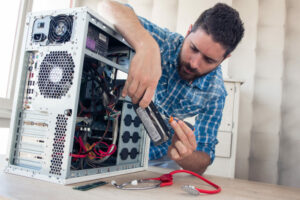In many people’s minds, upgrading your business technology comes down to one trade-off: cost vs reliability. This could be the deciding factor of going new or opting for refurbished.
The choice spans way beyond computers: it applies when replacing tablets, phones, POS systems, TVs, routers and much more.
Find out which option is best for your business, whether you even need to upgrade in the first place and how to dispose of your old tech if you do.
Do I need to replace my tech?
Though you think your machine might be knackered, it could have a good two or three years left in it.
Before you decide to go for a different model, ask:
- Does it impact on the productivity of my business?
- Is it almost as costly to repair as it is to run?
If the machine could work well with less software and fewer capabilities, your third option is to shift the functions that your old tech used to perform onto another machine, using the older one for basic tasks.
Once it’s time to upgrade, take the costs of the tech itself and the time/expense to train employees into account. You should also factor in how the new tech will integrate with your other business software.
Buying new business tech
A lot of small business owners buy new. For a higher upfront cost, they want a reliable machine with a longer life.
As the tech is new it’s likely that it will boost your productivity through the efficiency of the system. You may have already found that outdated systems can cost you more time searching for information which can be found more easily on newer systems.
‘We prefer buying new as we can specify the spec we require’
Having new technology might mean your tech is more compatible with the tech of employees who work remotely. Not only that, they allow you to automate processes and use certain communication platforms which you can’t with older tech.

“We prefer new tech because of the guarantees we get – we’ve have had issues with refurbished not working as well or breaking down after a few months of use,” said James Roberts, director of Sanctuary Bathrooms.
“We also prefer buying new as we can specify the spec we require instead of having to settle for either something we don’t need or something we don’t require.”
It’s more beneficial in terms of virus protection, too. The operating system will be up to date, fixing bugs and vulnerabilities of the previous versions. Then there are potential data breaches – dodging a detrimental hack will save you a hefty amount of money and trouble in the longer term.
However, cost can be an issue, which Roberts is aware of:
“To try and keep costs down, we would always buy outright to try and get the best deal and look around. We also have our PCs custom-built so we have them with the correct items. We don’t have to pay for features that we don’t need.”
What you need to know about refurbished technology
Before we begin, I want to stress that refurbished is not the same as used, but it’s still well worth considering.
The following are refurbished machines:
- Returned by the customer
- Damaged by the shipping process
- Store display models
- Models with cosmetic defects
- Opened-box models
- Overstock
When a company refurbishes a machine, they assess any damage and decide what needs to be added or replaced – things like putting in a different keyboard or screen, adjusting the hard drive and cleaning components. They’ll also take the machine apart to ensure that the pieces work.
Once it’s been seen to, your new tech should be working well and look like it’s new, with no obvious signs of damage.

One of the key advantages of refurbished for small businesses is that it’s cheaper than buying new. You could stand to save a substantial amount if you go for a refurbished model.
Don’t worry about post-purchase care as you still have the option of buying a warranty for refurbished machines, too.
Buying refurbished is more environmentally sound, stopping bits of tech from going to landfill and creating demand for more resources to create new machines.
James Thurlow-Craig, CEO of Create Designs, explains why he ‘religiously’ opts for refurbished tech over new.
“The primary reason is to save on the cost of onboarding new employees. Often it can be an expensive process introducing a new member of the team into the business, with additional PAYE costs, desk space and time training. Purchasing refurbished tech is a great way to massively reduce costs without a big compromise on functionality.
“Furthermore, it can be less problematic to setup a familiar system which you have prior experience with. Aside from Apple equipment, we also use refurbished VOIP phones and networking equipment.”
One consideration with refurbished machines is that they may not have the most up-to-date security software, leaving you more vulnerable to attack.
“In most cases, security patches and updates are handled with little chance of encountering a problem. Apps for security also tend to be less intrusive than with Windows-based applications and run in the background with no noticeable reduction in performance.”
Is it true that refurbished models are more likely to break down? Thurlow-Craig doesn’t seem to think so.
“Considering we have not had to service or repair any of the hardware since we began trading in 2011, compared with buying new, on average we would expect to save around 70pc of the cost versus buying brand-new. In my experience, technology depreciates at a rate far quicker than notable improvements are made.”
Be careful where you get your new machine, though – buy it from the manufacturer if you can. Failing that, an approved technician is also fine. Microsoft-authorised refurbishers provide PCs which are pre-installed with Microsoft software.
Dell Financial Services also sell refurbished models. If you don’t want to go brand specific, try Amazon Renewed or Newegg.
Online marketplaces can work for refurbished machines but do thorough research before you commit to buying anything.
“The traditional channels of eBay and Gumtree are always a good source to negotiate a good deal and more recently Facebook Marketplace,” says Thurlow-Craig.
‘If you are purchasing a used product on behalf of a limited company, your rights to a refund are often more limited than as an individual’
“We have also found that Shpock (a mobile app) has an increasingly large seller base. Often sellers on these platforms are motivated to sell quickly and can be contacted out of normal shop hours. It depends how urgently we require it.”
Research is always the most important thing when buying refurbished tech.
“It’s important to understand the technology you are purchasing,” says Thurlow-Craig.
“If you have never owned that particular item of equipment before, take the time to research common faults, inspect a brand new version of the item in-store and if you’re looking to purchase from a private seller, due diligence is key. Always look to purchase from the vendor’s home or office and not in an obscure location like a car park, for example.”
He adds that main brand tech manufacturers such as Apple allow you to enter the product serial code to check if it is stolen or the warranty has expired. Finally, if you are purchasing a used product on behalf of a limited company, your rights to a refund are often more limited than as an individual, so be sure to properly inspect before parting with cash.
What should I do with my old tech?
Under the Waste of Electrical and Electronic Equipment directive (WEEE), you can’t just chuck electricals in the general waste – anything with a plug or batteries applies. Hazardous substances like lead and mercury mean that these items can’t go to landfill while gold, copper, steel and aluminium can be recycled.
If you have a large amount of tech to dispose of, you can contact a local firm who will take it away. Major tech providers such as Dell, Apple and Lenovo offer recycling services for smaller lots or individual machines. You’ve probably seen lots of phone recycling services advertised like Envirofone and Mazuma Mobile too. Alternatively, you can recycle handsets through your current mobile phone provider.
Your other option is to donate your tech to a charity or a company that can refurbish it. Organisations like Digital Growth accept old electricals, so they can be your starting point.
As for data, make sure you wipe the hard drive if the machine is working and remove it if the machine is not. You can wipe it yourself with a data destruction program or by taking it to a specialist – we recommend finding one through the British Security Industry Association. Simply deleting files isn’t enough as they can be recovered by third parties or hackers.
Remember that old external hard drives and devices need to be cleared as well as routers and smart devices used to access networks like TVs and IP security cameras.





